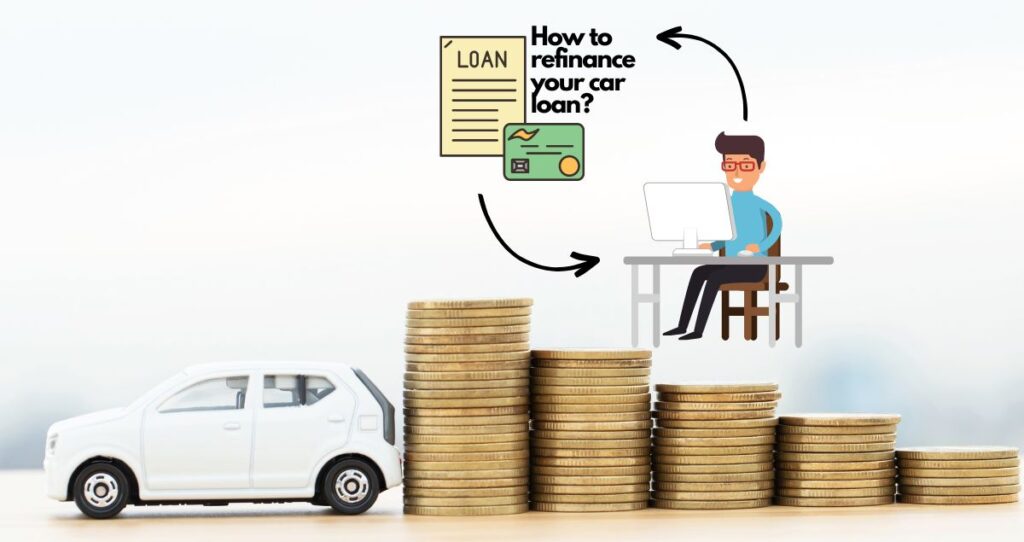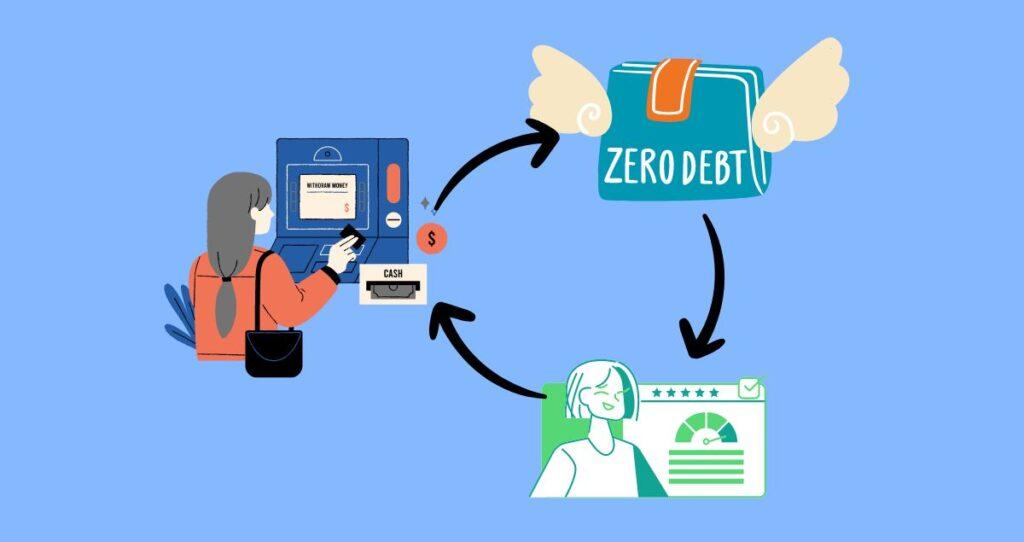If you are not happy with your current auto loan, you can easily refinance it for a better one. The process of refinancing your car loan involves replacing your current loan with a new one that has favorable terms. After refinancing your car loan, you will end up with a brand new loan, with a lower interest rate, a different length of the loan, or both. Learn how to refinance your car loan and easily qualify for the lowest interest rate and better terms.
Before you refinance your loan, you will need to check if you qualify for the refinance and if this is a good option for you. In order to qualify for lower interest rates and better terms, you must have a good credit score. Most lenders also prioritize borrowers with stable incomes, on-time payment track records, and established credit histories. A higher DTI ratio can also hinder your chances to refinance your car loan. So, pay off some of your debts before you refinance your loan.
This article will walk you through the process of refinancing your car loan.
How to refinance your auto loan?
The process of refinancing your auto loan is simple and straightforward. You first need to evaluate your current loan and see if refinancing is a good choice for you. You also need to list everything you need in a new loan and find lenders who can offer what you need.
For example, if you applied for a car loan when market rates were higher compared to what they are now, you will need a lender who can offer you a much lower interest rate. Even if you qualify to refinance your auto loan, you always need to consider closing costs and related fees and charges. If refinancing your car loan will not save you money, then this process might not be suitable for you.
The following are the steps you need to refinance a car loan.
1. Evaluate if refinancing your car loan is right for you
Before you send in your refinancing application, you first need to check if this is the right course of action. At the end of the day, your main task is to save money on the car, lower your monthly payment, or have better terms. In case you are struggling with higher monthly payments, refinancing your loan can help you lower your monthly charges. As a result, you can easily afford to pay off the car.
Take advantage of lower interest rate
- Did you have bad credit and a lower credit score when you first bought the car? If you have improved your credit score and rebuilt your credit, you can qualify for a much lower interest rate when you refinance your car loan.
- Interest rates have gone lower since you bought the car. There are times when you will buy a car when market rates are higher. Even if you are a Super-prime borrower, you will still lock in a higher interest rate. In case interest rates went much lower since you bought the car, you can refinance your car loan and take advantage of lower rates.
If you are struggling with your monthly payments due to higher interest charges, you can refinance your car loan to lower your payments. Lower monthly payments on your auto loan will make it easy to pay off the car, lower the cost of the car, and help you pay it off faster.
You can also refinance your car for a longer term or shorter depending on your financial situations
Refinancing your car loan is not all about saving money. Sometimes it is all about lowering your financial stress level. It is possible that you locked in a shorter term due to a stable income or you had two jobs when you bought the car. Shorter terms come with much higher monthly payments. Back then, you could afford these payments without any problem. What if you have lost one of the jobs? In this case, it might be difficult to make your monthly payments and meet other financial obligations on the same income.
If your monthly payments are proving to be harder to come by, consider refinancing your car loan for a longer term. By doing so, you will be able to lower your monthly payments and make the car affordable without working double shifts. Keep in mind that this strategy will increase the cost of the car due to holding the loan for a long time.
2. Understand your current loan payments and expected monthly payment after financing the loan
Locking in a new loan means that a lot of things will change. You first need to understand your current auto loan payments and how they compare with expected loan payments after refinancing your loan. For example, if you refinance your car loan for a much shorter term, your monthly payments will be higher than what you are used to paying.
Are you going to be paying more or less than you are paying now? If so, how much more or less, and where the money will come from?
3. Know your car value
Cars experience fast depreciation especially when you buy them new. A new car can easily lose up to 20% of its original value in the first year and 15% every year for the following four years.
If you bought a new car a few years back, your car is probably not worth as much as you think it is worth. By year 5, your car will most likely be worth 50% to 60% of its original value. During your refinance process, you will need to know if you will save money or lose some. You should refinance your car only if there is a higher loan balance on the car. Financing a car loan for a car that is almost paid off will only cost you money.
You might also like: Why is it a bad idea to buy a new car?
4. Check your credit score
Before your new lender assumes responsibility for your loan and takes the risk, the lender will first evaluate your payment activities, credit score, and credit history.
What the lender wants is a borrower who poses less risk. So, to qualify for competitive interest rates, you’ll need to have a very good credit score. Although some lenders will accept scores in the 600s; it is a good idea to refinance your car loan when you have a credit score of 720 or higher. This score puts you in the category of Super-prime borrowers, and therefore, helps you qualify for the lowest interest rate possible.
You should also check your payment activities and avoid missing any payments if you are planning to refinance your car loan. Focus on what the lender wants. The more you build your credit, clean up your credit reports, and pay your bills on time, the better.
5. Shop around for better rates
Not every lender will approve you for the same refinance rates. Lenders consider different factors when evaluating your creditworthiness. What one lender considers important might not be that important for another lender.
That is why you need to get multiple quotes. Your current lender might offer you discounts if your past performance aligns with the terms of your car loan. So, start from there. You should also consider other lenders such as banks, credit unions, and other lending institutions. Keep in mind that some lenders will pull your credit profile to give you an accurate estimation.
Requesting to view your credit profile will result in a hard inquiry on your credit reports and lower your score by 5-10 points. So, unless you are going with the lender, you should try to get an estimate before a lender pulls your credit profile.
Once you have been pre-approved by multiple lenders, choose the loan that offers better rates and favorable terms. At the end of the day, refinancing your loan will benefit you only if you can get what you want.
6. Choose the lender that will save you more money
Since each lender will qualify you for a different internet rate, fee, and terms; use these numbers to compare these lenders and stick with the one that will save you more money. You should also compare your savings with how much your current loan will cost you. If your savings are significant and you are getting better terms, then refinance the loan.
7. Get ready to refinance your car loan
After choosing the lender, you will need to get ready to refinance your auto loan. The lender will want to have your full identity. So, you will need to have proof of identity, full name, address, email address, phone number, social security number, etc.
The lender will also need details of your current loans. So, you need to provide proof of payment, proof of remaining balances, etc.
Having an income shows that you will make your monthly payments. So, you will need to provide proof of income such as paystubs, name of employer, and address.
Finally, your car information must also be registered by your new lender. So, be prepared to provide the model of your car, the make and year, color, etc. You might also need to show proof of auto insurance and the title of the car.
After refinancing your loan, any payment you make will go to your new lender. The terms of your new loan and monthly payments will also change.
When does it make sense to refinance your car loan?
Even if you qualify for the refinance, it is important to evaluate your options and refinance your car loan only when it makes sense to do so. Before you refinance your car loan, wait at least one year to catch up on fast depreciation on the car. Waiting a little longer will also help you build enough payment history and help you recover from the impact of the first car loan on your credit profile.
It will also make sense to refinance your car loan when the new loan will result in a much lower interest rate. That is having a lower interest rate will come with much lower monthly payments which will enable you to pay off the loan much faster. You should also refinance your loan when you are not too far behind with your current loan payments.
Finally, you need to evaluate the cost of the refinance with the benefits you are getting. At the end of the day, refinancing makes sense only when you are saving money or at least have favorable terms. Besides your closing costs on the new loan, your existing lender could also have loan termination fees. So, evaluate these fees and compare them with your savings.
Does refinancing a car loan lower my credit score?
Refinancing your car loan consists of applying for a brand-new loan. Before you get approved for the refinancing, the lender will first pull your credit file which will result in a hard inquiry on your credit reports. Each hard inquiry lowers your credit score by 5-10 points. The car loan refinances might also result in lowering the average age of your credit which might lower your credit score.
Where to refinance your auto loan?
When it comes to refinancing your car loan, you should always aim for lower interest and better terms. In case, you are not happy with your current lender, it might be a good idea to shop around for a more affordable auto loan.
You don’t have to stick to your current dealership or lender for the refinancing option. There are other lenders out there who are ready to work with you regardless of your financial situation. Most banks, credit unions, and other lending institutions can work with you. But, if you have a bank that you work with, it is a good idea to start from there. The history you have to build with your current bank can help you qualify for better terms.
How to qualify for the lowest interest rate on your loan?
The interest rate is one of the main factors to consider when you want to refinance your car loan. Lower rates make your monthly payments lower, reduce the cost of the car, and make it affordable to pay off the car. In order to qualify for the lowest interest rate when you are refinancing your car loan, there are certain criteria that you need to meet.
You first need to answer the following question. What does the lender want?
The answer to this question will boil down to risk assessment. Every lender wants a borrow with the least amount of risk possible. The lesser the risk you carry as a borrower, the more lenders will trust you with their money. More trust leads to giving you the lowest rate possible with better terms.
In order to assess borrowers’ creditworthiness, lenders categorize them into different groups based on their credit scores as detailed below.
Risk profiles of borrowers based on their credit scores
As your credit score goes lower, the risk involved in lending you money goes higher. For this reason, lenders will charge you a higher interest rate to balance that risk. According to the Consumer Financial Protection Bureau, the following are borrowers’ risk profiles based on credit scores.
- Super-prime (credit score of 720 or higher). A borrower in this category carries the lowest risks possible and therefore, qualifies for the best interest rate when borrowing money.
- Prime(credit scores of 660-719). Borrowers in this category pay a little bit higher interest rates because they carry more risk compared to Super-prime borrowers.
- Near-prime(credit scores of 620-659). This is the lowest credit score range to qualify for most loans. For example, you need a credit score of at least 620 to qualify for conventional mortgages. Most car loan providers lend money to borrowers in this category or better. A credit score below this level will get you denied an auto loan.
- Subprime (credit scores of 580-619). Most lenders will deny you credit. Some lenders might accept your car loan application but you will pay a much higher interest rate. Being in this category means that you carry more risks.
- Deep subprime (credit scores below 580). If your credit score is in this category, you will be denied credit from every corner of the lending industry. Yes, there are risky-takers out there. But, in case you qualify for a car loan or auto refinance, you’ll pay the highest interest rate possible. The terms of your loan will also be strict. This is because borrowers in this category pose more risk than any other category. Deep subprime borrowers usually have bad credit and are more likely to default than other borrowers. That is they don’t pay their bills on time, they have negative items on their credit reports such as defaults, late payments, charge-offs, foreclosures, etc. It is also possible that you can have bad credit due to other financial decisions such as maxing out your credit cards and carrying more debts. For this reason, you will be denied credit or pay the highest interest rate if you are in the Deep-subprime category.
You might also like: How to get the best car loan rates?
So, how to qualify for the lowest auto refinance rate?
In order to qualify for the lowest interest rate, you need to be a super-prime borrower. That is you need a credit score of at least 720. Lenders offer the lowest interest rate to their super-prime borrowers because they post the lowest risks. Super-prime borrowers pay their bills on time, respect the terms of their loans, and are less likely to default on their loans. For this reason, they get rewarded with the lowest interest rate and favorable terms.
If you want to refinance your car loan, work on your credit score. At the end of the day, refinancing your car loan might not be worth the hustle if you cannot lock in a cheaper interest rate.
In case you cannot be in the Super-prime category, at least be a Prime borrower. You will still pay a slightly higher interest rate. But, the terms of your loan might be favorable if you check other boxes such as having a lower Debt to income(DTI) ratio, a stable income, a track record of on-time payment, and a well-established credit history.
Is it a good idea to finance your car purchase with a car loan?
Buying a new car is never a good idea. But, financing your car purchase with a car loan, especially a new one is much worse. This is because the risk involved with owning brand-new cars outweigh their benefits.
When you purchase a car with a car loan, you end up paying interest on the loan and a bunch of fees. These extra costs increase the cost of the car and make your monthly payments unaffordable. In case, you buy a new car, it will also depreciate at a much higher rate. A new car can lose up to 20% of its original value within the first year and up to 15% each year for the following 4 years. In order words, a new car will lose 40 to 50% of its original value in just 5 years. This depreciation does not justify the reasoning behind buying a new car in the first place.
Brand-new cars cost more money which means you borrow more money unless you have a large down payment. The higher your principal amount, the more interest charges you pay. On top of higher interest, your insurance will also be higher. You will also be required to purchase full coverage on a car you purchased with a loan.
If you have some savings, consider purchasing a used car with cash. This strategy will prevent you from taking out expensive car loans. You will also have full control of the car. That is you will pay no monthly payments, no extra fees, no charges, and more importantly, no lien on the car. Since used cars are cheaper, your insurance will be cheaper. You can also get liability insurance in case your car has less value.
You might also like: How to save money for a car: A complete guide
Used car vs. new car: Which one should you buy?
Financially speaking, a used car is always the best option. When you compare the benefits you get from buying a used car vs. a new car, used cars stand out. Yes, new cars come with a lot of updated features, run better, look better, etc. But, you also pay more bucks for this leisure.
The following are side-by-side comparisons of buying a used car vs. a new car.
| Features | Used car | New car |
| Down payment | Lower down payment | Higher down payment |
| Cost | Cheaper | Expensive |
| Insurance | Higher insurance. You can have liability insurance if the car is old | Expensive. You will need full coverage whether you purchase with a loan or not because you have more to lose. Lenders require full coverage |
| Depreciation | Low depreciation rate | Fast depreciation. Can lose 40% to 60% of their value in just 5 years |
| Fees | Lower fees | You pay a lot of fees |
| Affordability | Affordable for both loans or paying with cash | Not affordable. It is also hard to pay to purchase new cars with cash because they cost more |
| Maintenance | Can cost you more in maintenance, especially in much older models | Less likely to break down and run better |
| Features and gadgets | Older safety features and outdated gadgets | Updated safety features and gadgets |
If you don’t like really old cars, buy cars that have depreciated already. A 4-5-year car can offer similar benefits you get from new cars. Instead of paying the full price for a new car, you will purchase them at a 40% or more discount. These cars also run and look like new ones.
The bottom line
It is easy and straightforward to refinance your car loan. If you don’t like your current lender due to higher interest rates or less favorable terms, refinancing your car loan could be a good financial decision. Before you refinance your loan, however, you need to evaluate whether this route is right for you. Make sure that the cost of refinancing an auto loan is less than what you will benefit from the refinance.
A good credit score will help you qualify for the best terms and a lower interest rate. Being in the Super-prime category shows that you pay your bills on time and you are financially responsible. In other words, you will never fall behind on your payments or default on your loan. For this reason, you will qualify for the lowest interest rate.
You should also shop around and get quotes from multiple lenders as they apply different weights to information from your financial profile. If you are not getting what you want, keep looking or improve your credit profile for better terms.









